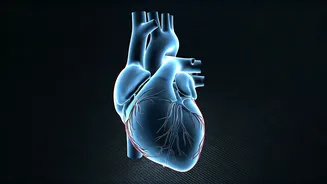Understanding Hypertension
Hypertension, often called high blood pressure, arises when the force of blood against artery walls consistently elevates. Blood pressure values are measured
with two numbers: systolic and diastolic. Systolic pressure reflects the force as the heart beats, and diastolic pressure measures the force when the heart rests between beats. A normal reading usually falls below 120/80 mm Hg. Elevated blood pressure can strain arteries, leading to several health problems. It is crucial to recognize the potential causes, including lifestyle factors, genetics, and underlying medical conditions. Regular monitoring and adopting a healthy lifestyle are essential steps in managing the condition and averting serious health consequences. Effective management includes lifestyle modifications, medication, and regular checkups to maintain optimal blood pressure levels and safeguard overall well-being. Understanding these aspects allows for proactive health management and a better quality of life. Seek professional medical guidance for accurate diagnosis and customized treatment plans.
Heart Health at Risk
Hypertension significantly impacts heart health by increasing the workload on the heart, leading to potential complications like heart failure, coronary artery disease, and stroke. The heart has to pump harder to circulate blood, causing the heart muscle to thicken, a condition known as left ventricular hypertrophy. This thickening decreases the heart's pumping efficiency, making it prone to failure. High blood pressure also damages the arteries that supply blood to the heart. When the arteries become damaged, they are more likely to develop atherosclerosis, a buildup of plaque that can block the arteries, leading to a heart attack or angina (chest pain). Furthermore, hypertension increases the risk of stroke. High blood pressure can weaken the arteries in the brain, increasing the chance of rupture and causing a stroke. Control of blood pressure is essential to protect the heart and reduce these risks. Regular monitoring, adopting a healthy lifestyle, and seeking timely medical intervention are vital steps. Prioritizing heart health through hypertension management can prevent serious heart-related complications and enhance overall cardiovascular well-being.
Brain's Vulnerability Explained
The brain is highly susceptible to the effects of high blood pressure, often leading to conditions that diminish cognitive function and increase the risk of stroke. Chronic hypertension damages the delicate blood vessels in the brain, making them more vulnerable to rupture or blockage. This damage can cause strokes, leading to brain damage, physical disabilities, and even death. High blood pressure also contributes to cognitive decline and vascular dementia, which impacts memory, thinking, and reasoning skills. Small vessel disease is common in people with hypertension; it reduces blood flow to different regions of the brain and causes a slow, gradual loss of cognitive abilities. Managing hypertension is, therefore, crucial to safeguarding the brain. This involves regular monitoring of blood pressure, adhering to medical treatment plans, and adopting lifestyle changes to minimize the risk of stroke and cognitive impairment. Controlling blood pressure protects the brain's health and maintains its functionality. Timely medical interventions and lifestyle adjustments significantly contribute to reducing these risks and improving overall cognitive health.
Kidney Damage Concerns
Hypertension poses a major threat to kidney health, potentially leading to chronic kidney disease (CKD) and kidney failure. High blood pressure damages the small blood vessels within the kidneys, interfering with their ability to filter waste and excess fluids from the blood. Over time, this damage can lead to a condition called nephrosclerosis, where the kidney tissues scar and lose their functionality. Kidney damage due to hypertension often progresses slowly, and people may not exhibit symptoms until the disease is well advanced. Early detection and management are vital to slow or prevent further kidney damage. The key lies in controlling blood pressure through lifestyle adjustments and medication, and regular monitoring can help assess kidney function and detect any emerging issues. Furthermore, controlling blood pressure protects the kidneys, preserving their capacity to filter and maintain overall health. This proactive approach significantly reduces the risk of long-term kidney complications and aids in maintaining a good quality of life.
Overall Health Impact
The impact of hypertension extends beyond specific organs, affecting overall health and well-being. High blood pressure contributes to several health conditions and can significantly reduce the quality of life. Elevated blood pressure can increase the risk of peripheral artery disease (PAD), where arteries narrow, decreasing blood flow to the limbs. It may also result in eye damage, a condition known as hypertensive retinopathy, which can lead to vision problems. Moreover, hypertension has been linked to sexual dysfunction in both men and women, affecting physical intimacy and relationships. Effective management of hypertension requires a comprehensive approach, which integrates medication, lifestyle adjustments, and consistent monitoring. Regular exercise, a balanced diet, and stress reduction techniques play a crucial role in lowering blood pressure. Prioritizing overall health through lifestyle improvements and medical care is essential for mitigating the diverse effects of hypertension, ensuring a longer and healthier life. This comprehensive strategy is crucial to maintain optimal well-being.




















